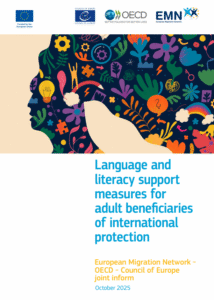EMN, European Council and OECD joint inform gives an overview of language and literacy support measures for beneficiaries of international protection
07.11.2025Proficiency in the language of the host country is a key component for the integration of beneficiaries of international protection (BIP), as it facilitates social participation, social interactions and social links that can foster social cohesion, as well as education and labour market integration. This joint EMN, Council of Europe and OECD inform focuses on language and literacy support measures for adult BIP in EMN Member and Observer Countries. Both formal and non-formal learning measures, as well as literacy programmes aimed at supporting BIP in learning the language of the host country, are included in its scope.
Key findings:
- Twenty-three out of 24 reporting (EMN) Member and Observer Countries provide targeted and/or mainstream language support measures that adult BIP can access. EMN Member and Observer Countries offer a broad variety of formal and non-formal language learning options. The actors involved in the design and implementation of language support measures differ widely.
- Language support measures for adult BIP are often implemented by educational institutions. Other stakeholders include local authorities, civil society and international organisations.
- Attending language and literacy support measures is mandatory for adult BIP in 11 EMN Member and Observer Countries. Language support measures are tailored to literacy levels in 17 EMN Member and Observer Countries, including for those with little or no schooling, who are illiterate or who need support to learn a different alphabet or with digital literacy.
- Key elements of quality assurance include quality standards, feedback mechanisms and educator qualifications.
- Twelve EMN Member Countries reported good practice examples of language measures to facilitate access to the labour market for adult BIP. These include: language measures accompanying labour market entry; sector-specific initiatives; workplace-based language support; and employer schemes. Other good practices highlighted are practical language courses outside the classroom, volunteering, courses for specific target groups, and digital tools.
- Additional support measures are provided for BIP by EMN Member and Observer Countries, such as convenient course times and locations, childcare, individual support (funding, support from a counsellor, etc.), online courses, and authorised leave from work to attend specific language classes.
- Eighteen EMN Member and Observer countries monitor the language and literacy levels of adult BIP before and/or after participating in language support measures.
Download the inform here.
